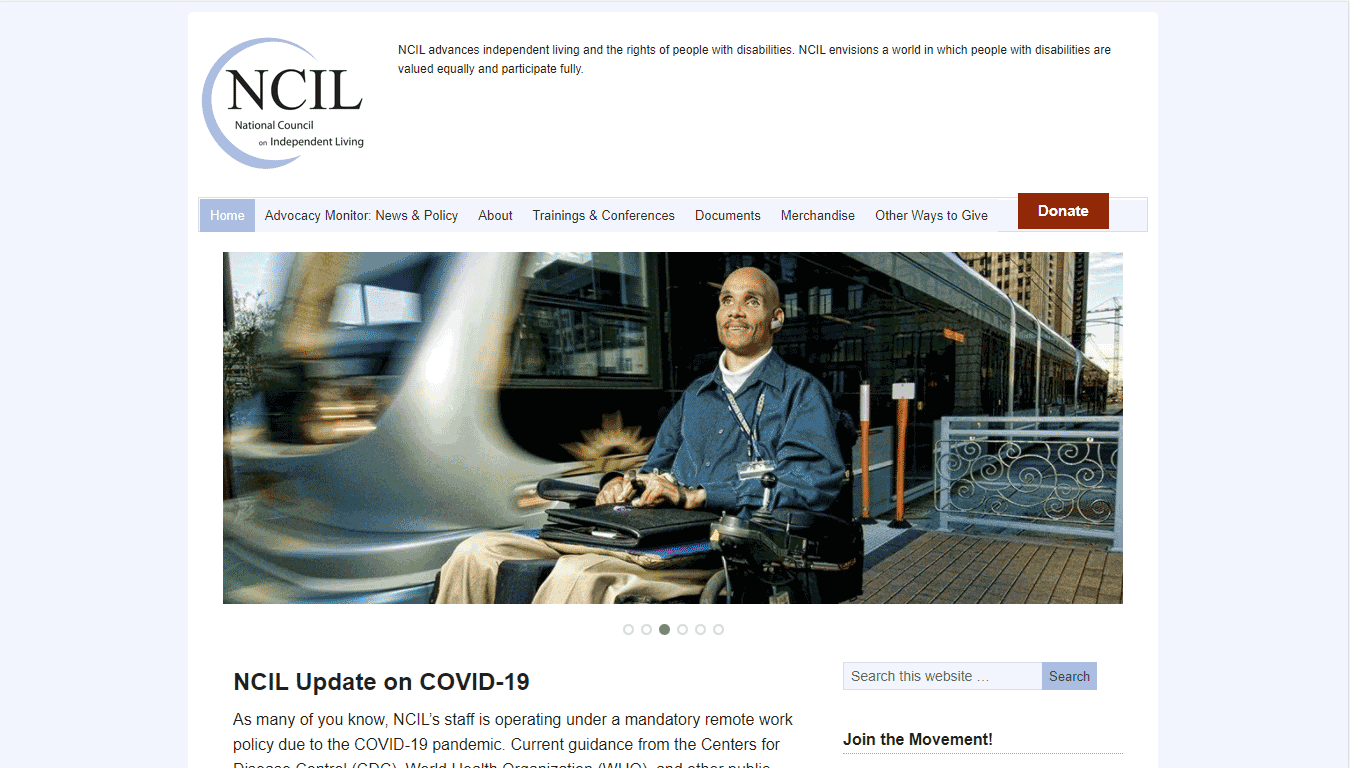Legal
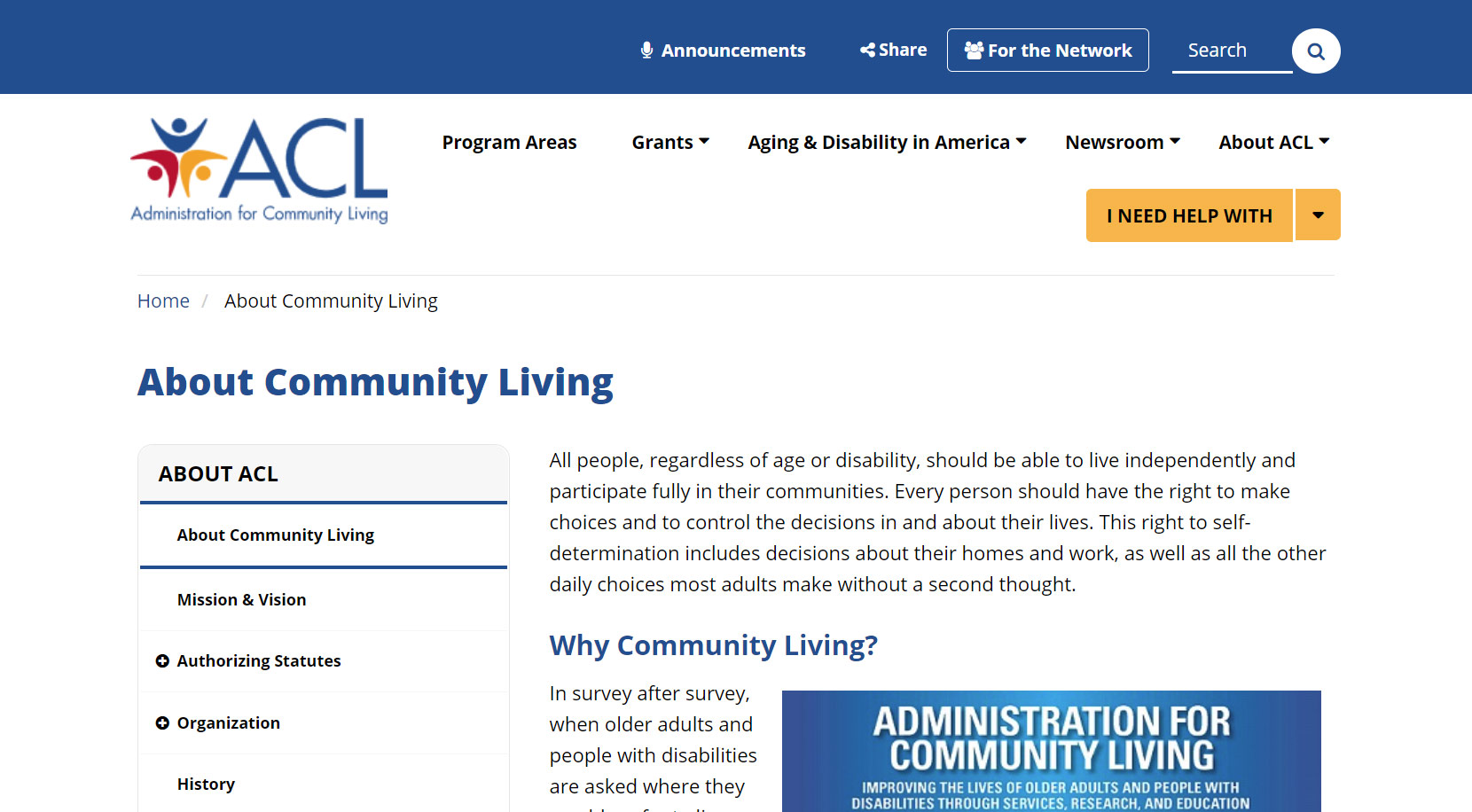
About Community Living
ACL’s creation was rooted in the fundamental idea that people with disabilities or functional limitations of any type, regardless of age, have a common interest in being able to access home and community-based supports and services. And further, that these supports make the difference in ensuring that they can fully participate in all aspects of society, including the option to live at home.
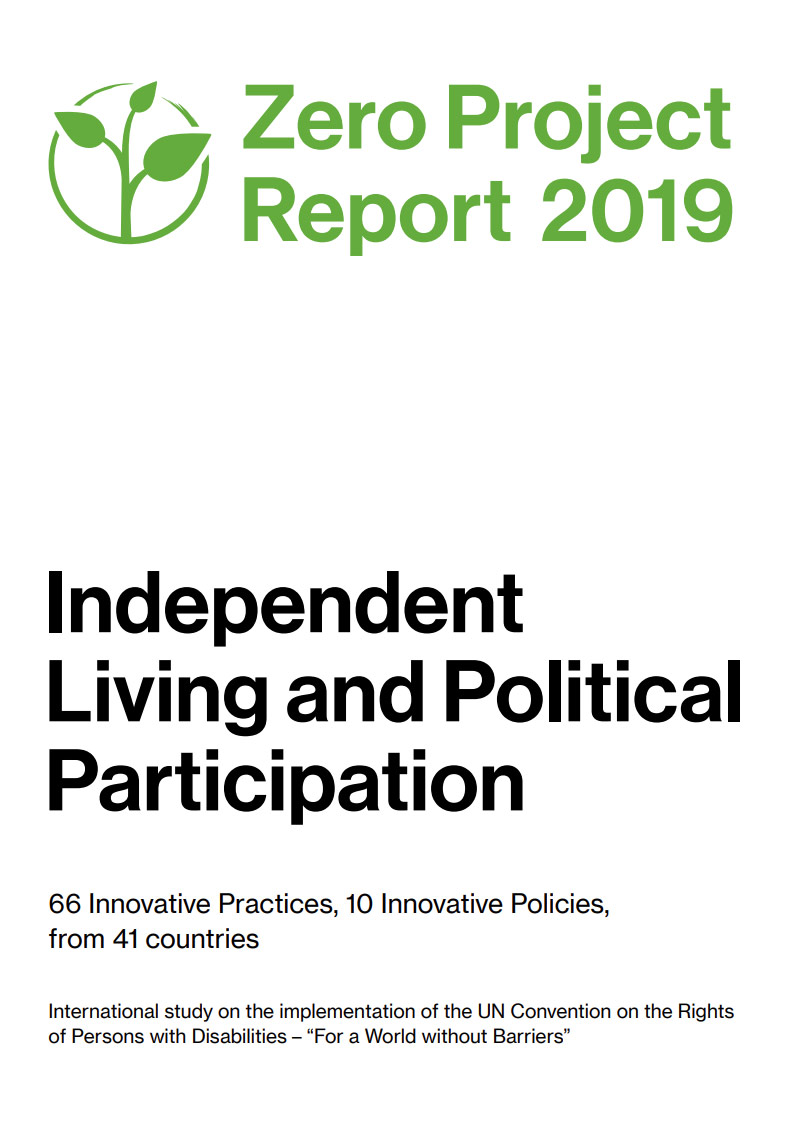
The Zero Project Report 2019 on Independent Living and Political Participation
66 Innovative Practices, 10 Innovative Policies, from 41 countries International study on the implementation of the UN Convention on the Rights of Persons with Disabilities – “For a World without Barriers”
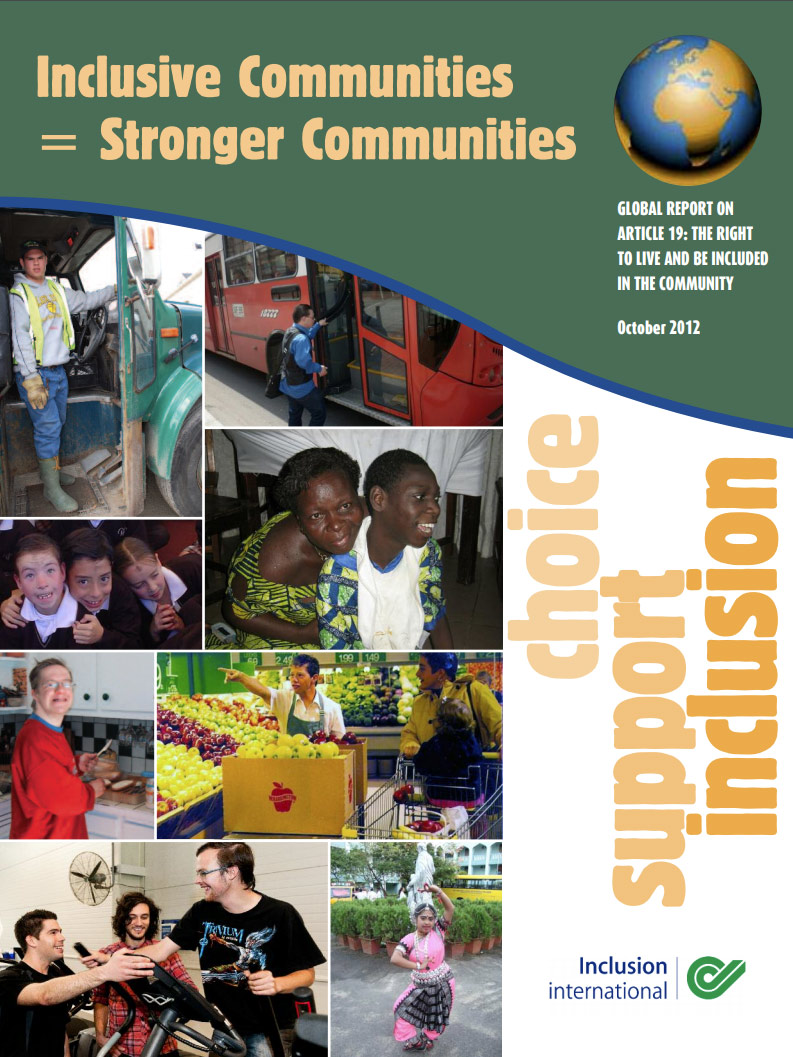
Inclusion International Global Report On Article 19 The Right To Live And Be Included In The Community
Global Report on Article 19: The right to Live and be included in the Community.
NZ Choice In Community Living Cabinet Paper
This paper asks the Cabinet Social Policy Committee to note decisions taken by the Minister of Health and Associate Minister of Health (Hon Tariana Turia) to demonstrate “Choice in Community Living”, which is an alternative to residential services for people with disabilities.
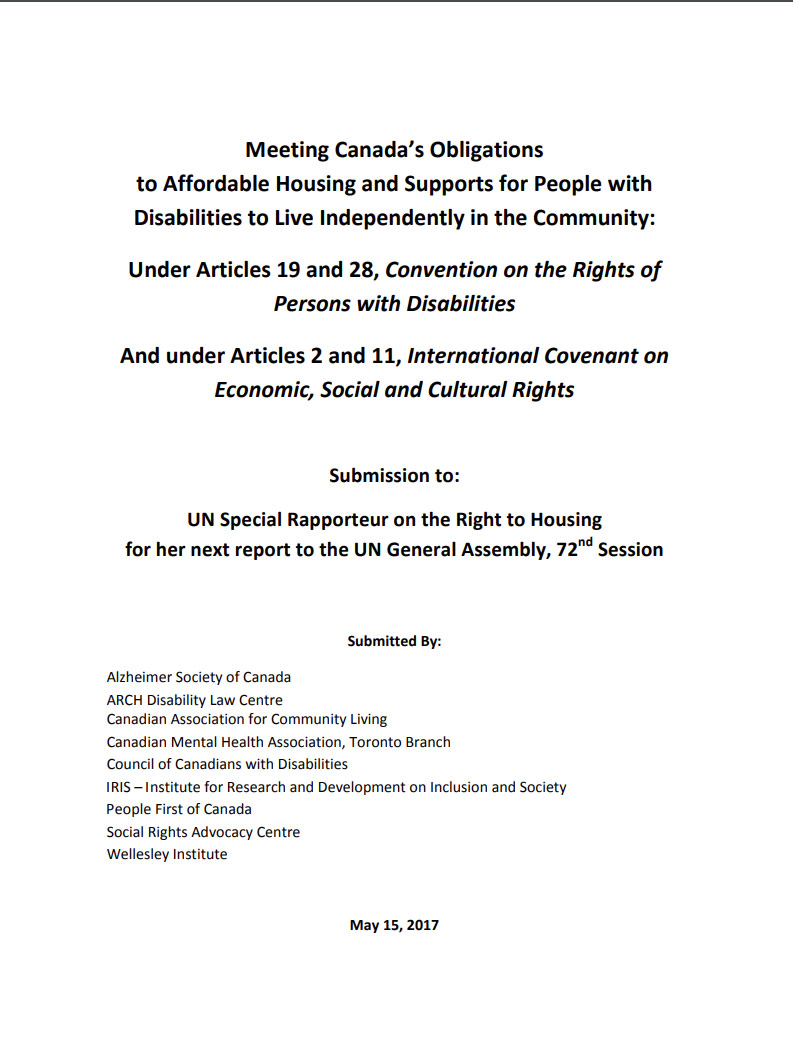
Meeting Canada’s Obligations to Affordable Housing and Supports for People with Disabilities to Live Independently in the Community: Under Articles 19 and 28
This submission is about the housing and supports gap facing persons with disabilities in Canada. It responds to the Special Rapporteur on adequate housing`s questionnaire and provides information for her report to the United Nations General Assembly 72nd session on the right to adequate housing of persons with disabilities.
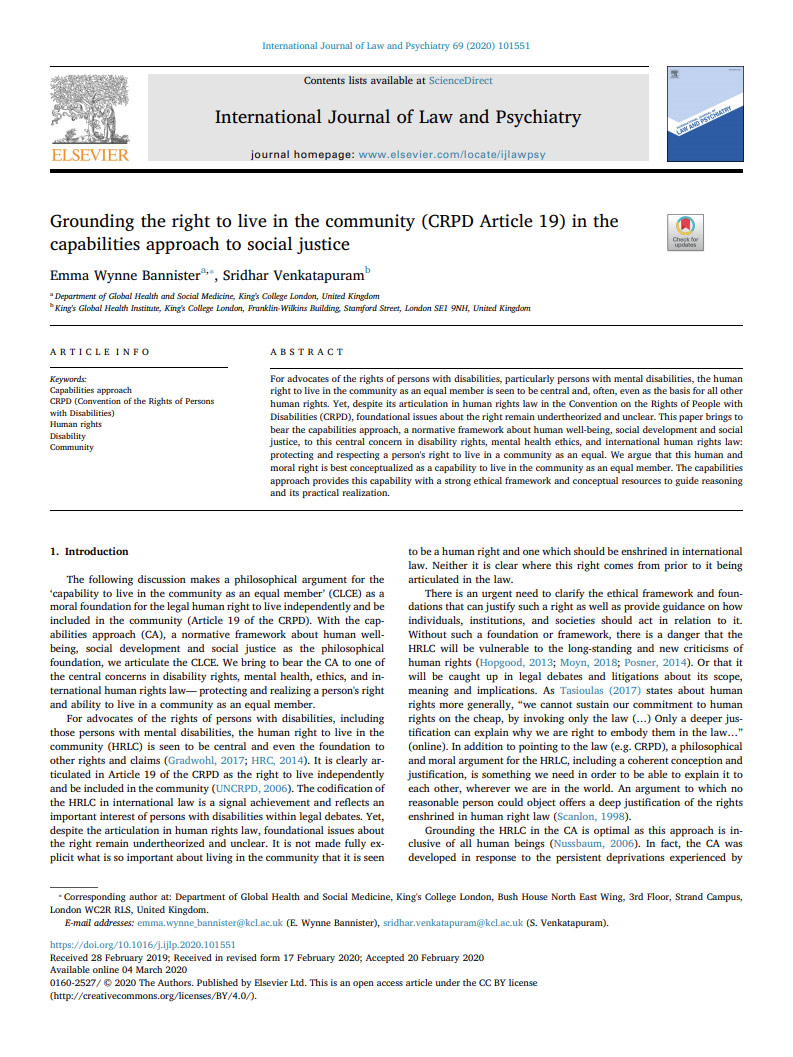
Grounding The Right To Live In The Community (CPRD Article 19) In The Capabilities Approach To Social Justice
This paper brings to bear the capabilities approach, a normative framework about human well-being, social development and social justice, to this central concern in disability rights, mental health ethics, and international human rights law.
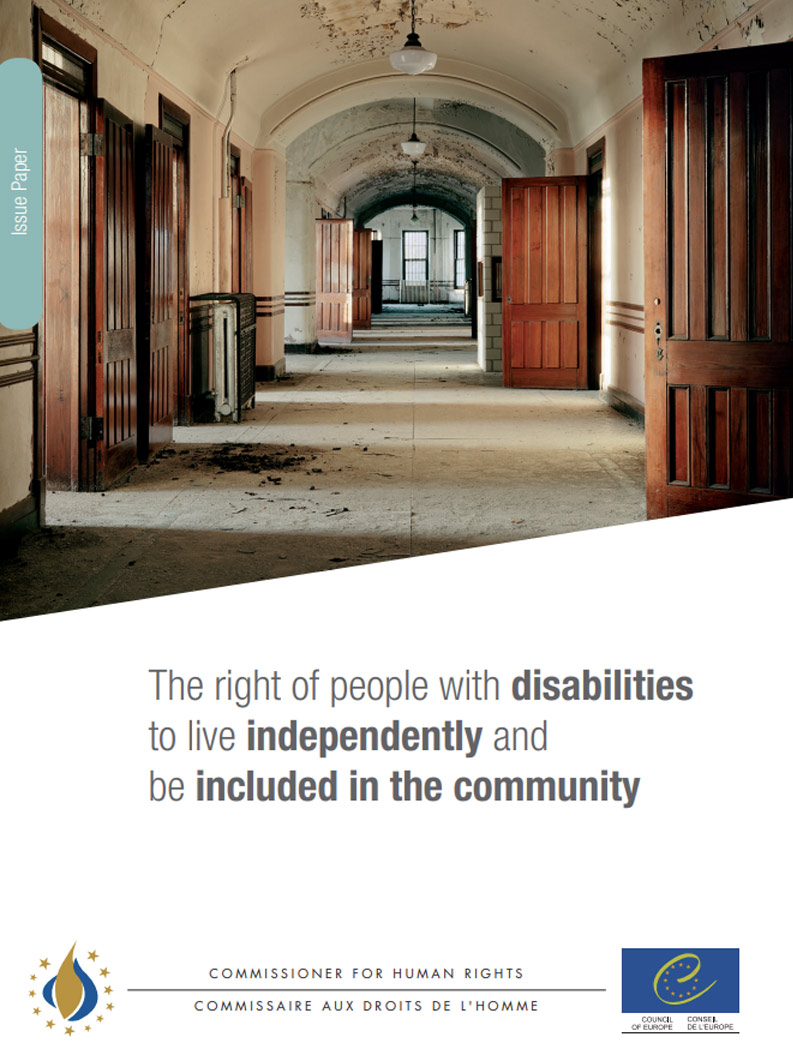
The Right Of People With Disabilities To Live Independently And Be Included In The Community
Recognizing the right to live in the community is about enabling people to live their lives to their fullest within society and access the public sphere, including “small places, close to home.”
It is a foundational platform for all other rights: a precondition for anyone to enjoy all their human rights is that they are within and among the community.
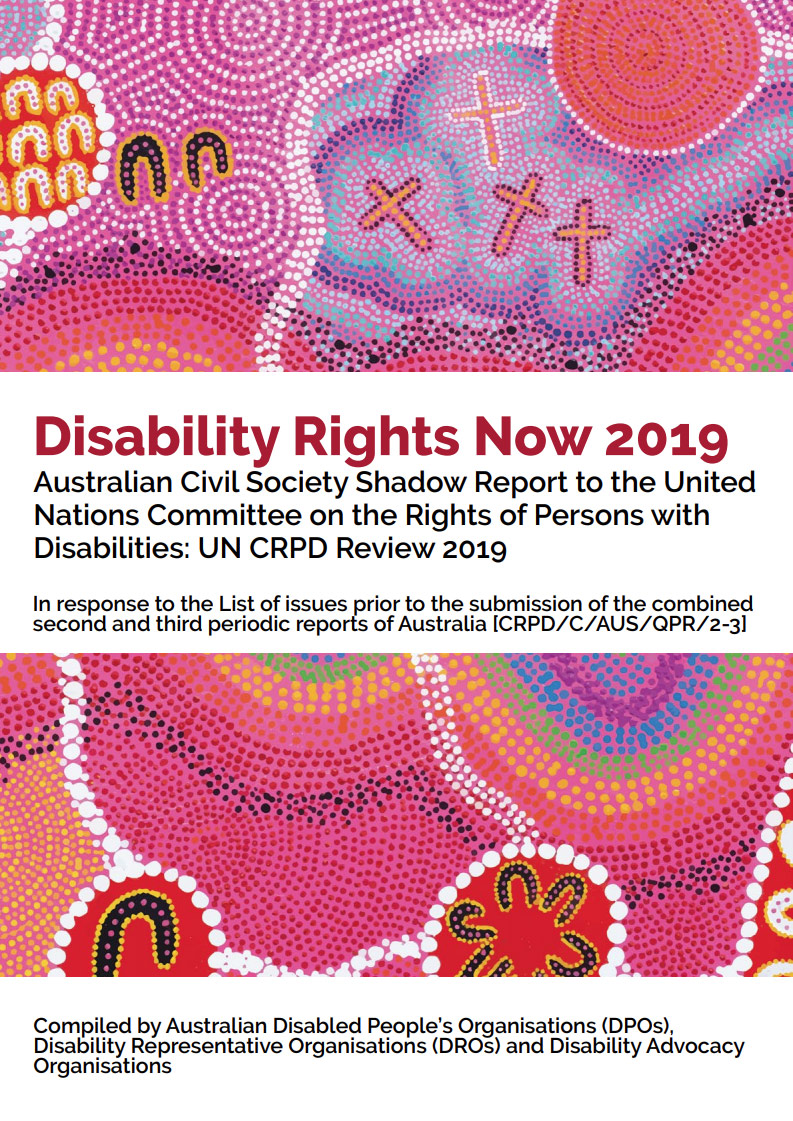
Disability Rights Now Shadow Report 2019
Australian Civil Society Shadow Report to the United Nations Committee on the Rights of Persons with Disabilities: UN CRPD Review 2019 In response to the List of issues prior to the submission of the combined second and third periodic reports of Australia.

IAC Report Pathway to Innovative and Contemporary Options of Housing and Support
This paper is underpinned by the United Nations Convention of the Rights of Persons with Disabilities (UNCRPD) as outlined in the Objects of the NDIS Act. Article 19 of the UNCRPD – Living independently and being included in the community – outlines the most pertinent requirement in relation to housing and support; enabling NDIS participants the opportunity to choose where they live, with whom they live and have access to a range of in-home, residential and other services to support living and inclusion in the community.

What is Article 12 and Legal Capacity?
The UN Convention on the Rights of Persons with Disabilities (UN CRPD) is a binding United Nations human rights treaty for persons with disabilities – Signed and ratified by almost all EU Member States and the EU itself. Article 12. of the UNCRPD wants to ensure that every person with disabilities including people with psychosocial disabilities may enjoy equal recognition before the law which requires legal capacity. This short animated video seeks to explain what legal capacity is all about and recalls that everyone has the inherent right to make their own choices including people with psychosocial disabilities.
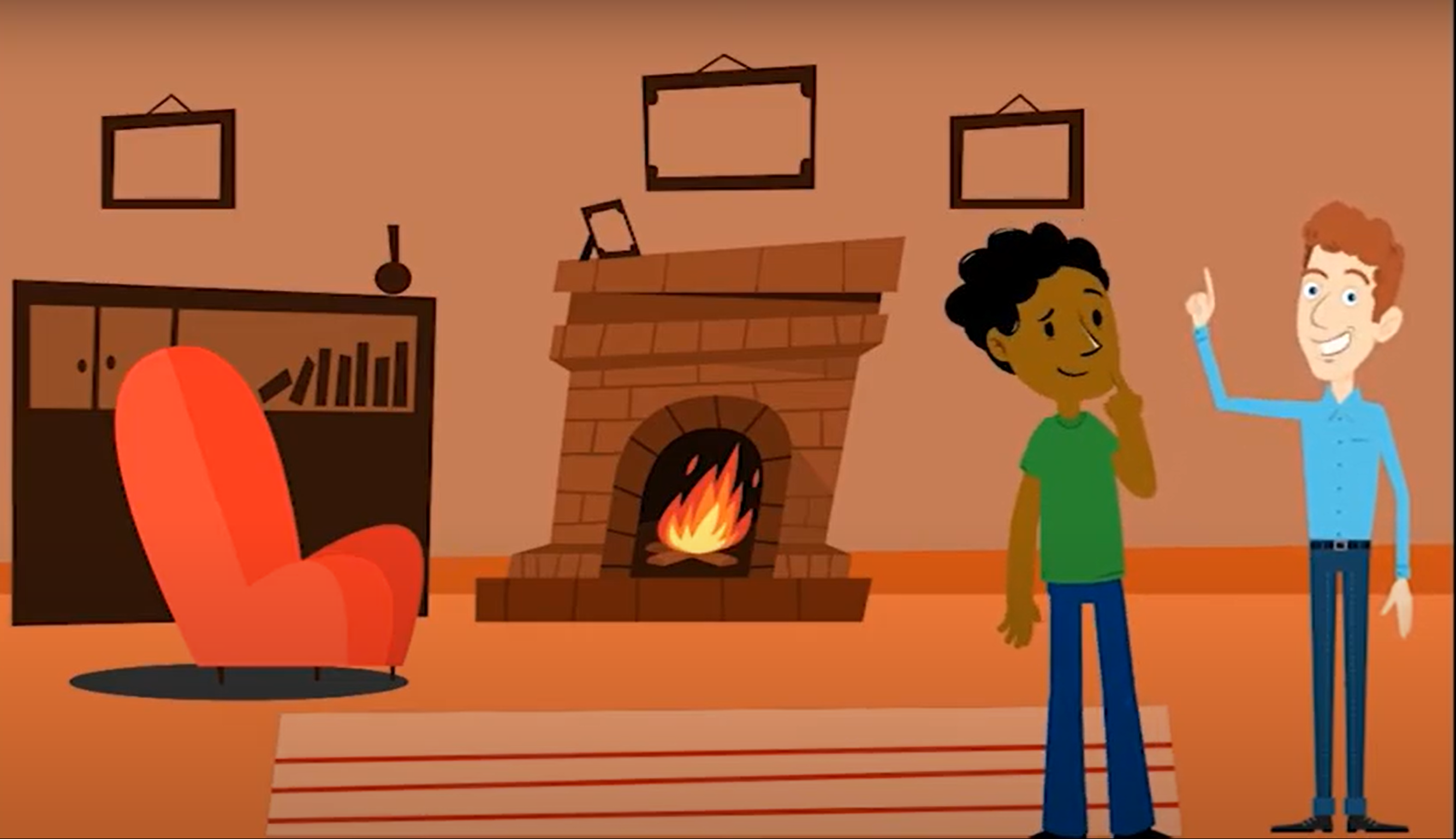
What is Article 19 and Independent Living?
The UN Convention on the Rights of Persons with Disabilities (UN CRPD) is a binding United Nations human rights treaty for persons with disabilities. This short-animated video seeks to explain what Art 19 and independent living means for all people with disabilities, including people with psychosocial disabilities.

The Right to Legal Capacity Under the UN Convention on the Rights of Persons with Disabilities: Key Concepts
This paper is written with people with intellectual disabilities in mind, but the questions, analysis and approach may be more widely applicable to other groups as well. The aim is to examine theories of ‘personhood’ for the criteria they provide for founding and recognizing the right to legal capacity. The paper examines how current criteria of personhood and legal capacity systematically discriminate against people with intellectual disabilities in recognition and enjoyment of their legal capacity. It draws on more recent conceptions of personhood from moral and political philosophy to suggest
directions for law reform that could be taken to address this barrier in law, policy and practice.
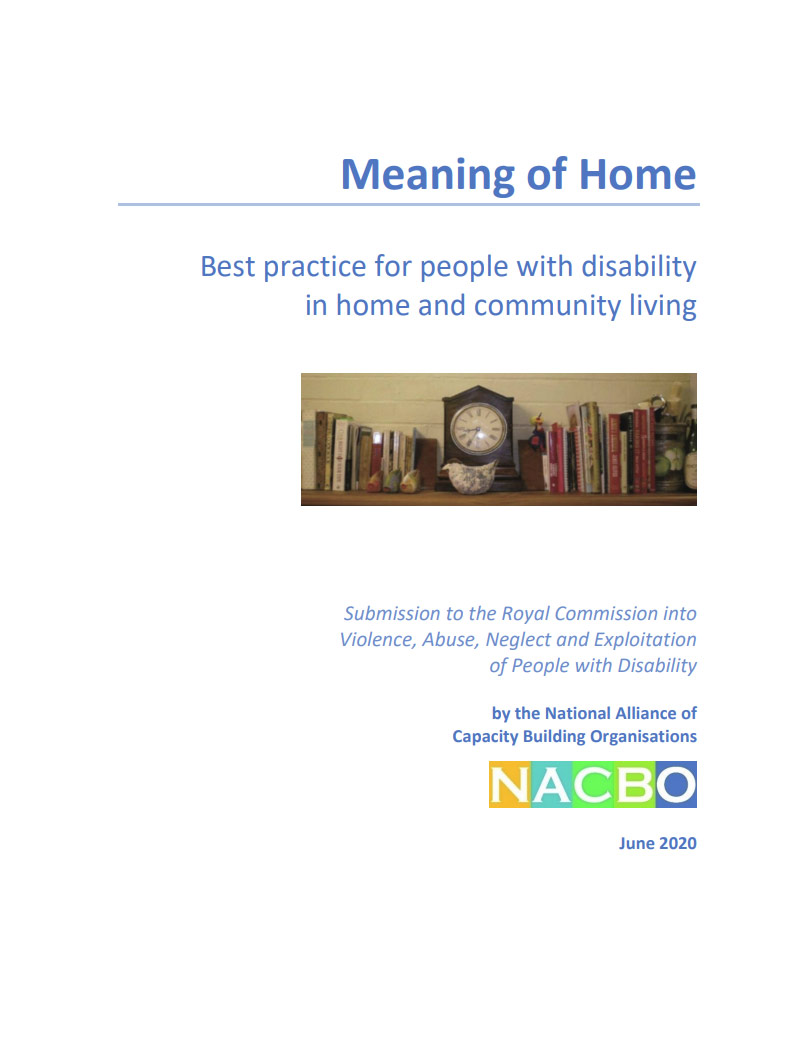
NACBO: Meaning Of Home Submission
The National Alliance of Capacity Building Organisations (NACBO) is a national network of not-for profit, values-based, capacity building organisations. This document is NABCO’s submission to the Royal Commission into Violence, Abuse, Neglect and Exploitation of People with Disability. We define the meaning of home and what we consider to be best practice in home and community living. We list what each sector can do; people with disability themselves, families, allies, services, or government. We then consider how best practice for a few can become accepted practice for many. We offer three take-home messages from our work and offer four recommendations for government action. Finally, we share twenty-three stories which illustrate that people with disability can have a home of their own, establish networks of family and friends and contribute to a community where they belong.

Union of Equality: Strategy for the Rights of Persons with Disability 2021-2030
With this Strategy, the Commission aims to deliver further significant improvements to all areas of the lives of persons with disabilities within the EU and beyond. Over the coming decade, this Strategy will support both Member States and EU institutions in their endeavour to implement the UNCRPD. Accomplishing the initiatives envisaged in this strategy will contribute to reducing discrimination, inequalities and supporting persons with disabilities to fully enjoy their human rights, fundamental freedoms and EU rights on an equal basis with others, by 2030, to maximize their independence, participation and decent living conditions.

EU Disability Strategy 2021-2030
The European Commission adopted the European Disability Strategy, entitled “Union of Equality: Strategy for the Rights of Persons with Disabilities 2021 – 2030” in March. The aim of the strategy is to tackle the challenges disabled people face, at the EU and Member State level, and to ensure that disabled people: enjoy their human rights, have equal opportunities, have equal access to participate in society and economy, are able to decide where, how and with whom they live, can more freely in the EU regardless of their support needs, and no longer experience discrimination.

WWDA Response To Group Homes Issues Paper
Women With Disabilities Australia (WWDA) submission in response to the Royal Commission’s Group Homes Issues Paper. In the context of living arrangements for people with disability, including group homes, the Royal Commission should recognise article 19, Living independently and being included in the community, as wide-ranging and all-encompassing of the Convention on the Rights of Persons with Disabilities (CRPD) , and as critical to the prevention of violence, abuse, neglect and exploitation.

The Struggle to Ensure all People with Disabilities can Live In a Home of Their Own
The video features a panel discussion convened by Open Society Foundations. Following years of litigation, a landmark settlement in the Brooklyn federal court affirmed the right to live in and be included in the community. This gave more than 4,000 people with disabilities the opportunity to move out of group homes and into their own apartments. While exposing gaps in the support people received for their moves into the community, the film also raises important questions: Can we deconstruct the implicit notion that some individuals with disabilities should not be in charge of their own lives? How can we better provide support—as distinct from control or protection—for formerly institutionalized members of our communities? Should people have to choose between the dignity of choice and freedom, and the dignity of physical safety?

Independent Living
All people have a right to independent living under Article 19 of the United Nations Convention on the Rights of Persons with Disabilities (UN CRPD). This article recognises: “the equal right of all persons with disabilities to live in the community, with choices equal to others, and shall take effective and appropriate measures to facilitate full enjoyment by persons with disabilities of this right and their full inclusion and participation in the community”.

Deinstitutionalisation: Concluding observations on the initial report of France
France was reviewed by the UN Committee on the Rights of Persons with Disabilities (Committee) in August 2021. The Committee notes the lack of arrangements for independent living and indvidualised support for disabled people.

From Institutions to Community Living for Persons with Disabilities: Perspectives From the Ground
This report aims to support ongoing efforts to bridge the gap between the promise of law and policy, and the reality on the ground. The exclusion and isolation stemming from institutionalisation of persons with disabilities has prompted a recognition of the need to ensure that people with disabilities can live in the community on an equal basis with others.

Young Adults: Long Term Care Facilities
Victoria Levack is one of 87 Nova Scotians between the ages of 30 and 49 who live in long-term care facilities. Some are hoping the outcry over long-term care facilities will bolster enthusiasm for government funding programs that make living at home a viable option. In a landmark decision issued on October 6th 2021, the Nova Scotia Court of Appeal said the provincial government’s failure to offer people with disabilities “meaningful” access to housing and care is demonstrated by long wait lists. The human rights decision also concluded that there wasn’t wider discrimination regarding how housing and supports were provided by the state to people with disabilities.

Federal Pre Budget Submission – A Place to Call Home
This pre-budget submission outlines a range of innovative ways that this housing crisis for people with disability can be solved now by the Federal Government. Many people with disability struggle to find a place to call home and there are a range of issues that make the housing market out of reach. The submission has been developed with input from the Summer Foundation, the Australian Network for Universal Design and National Shelter.

There’s No Place Like Home: The right to live in the community for people with disabilities,under International Law and the domestic laws of the United States and Israel
This article explores the developing ‘right to live in the community’ for people with disabilities under international law and the domestic laws of two countries: the United States and Israel.

From Institutions to Community Living
“Recognizing the right to live in the community is about enabling people to live their lives to their fullest within society. It is a foundational platform for all other rights: a precondition for anyone to enjoy all their human rights is that they are within and among the community.” This report is one of a series of three reports looking at different aspects of deinstitutionalisation and independent living for persons with disabilities.

Guidance on Community Mental Health Services
Countries who have ratified the Convention of the Rights of Persons with disabilities (CRPD) have an obligation to create the conditions for an active civil society which engages in policy making and advocates for the full participation of people with mental health conditions and psychosocial disabilities and their organizations, as a movement to be listened to and reckoned with. Government respect and support of movements of people with lived experience creates an environment which allows people to have a stronger voice to demand that their rights and interests are respected. This publication promotes good practice and person-centred, rights based approaches.

Inquiry into Violence, Abuse and Neglect against People with Disability in Institutional and Residential Settings
This Submission from the Australian Cross Disability Alliance is the culmination of more than two decades of people with disability and their allies campaigning and advocating for a national, independent inquiry to investigate violence and abuse against people with disability in institutional and residential settings. One of the most pervasive human rights abuses experienced by people with disability is their segregation, isolation and confinement from the community in institutional and residential settings. The ACDA was founded by, and is made up of four national cross-disability DPOs: First Peoples Disability Network Australia (FPDNA); Women With Disabilities Australia (WWDA); National Ethnic Disability Alliance (NEDA); and People with Disability Australia (PWDA).

Convention on the Rights of Persons with Disabilities Research Report – Easy Read
This Easy Read report is a summary of a report called Convention on the Rights of Persons with Disabilities: Shining a light on Social Transformation.

My Life Story
Justin Clark tells the story of how he fought for the right to make his own decisions and leave the institution where he lived for 18 years, to live his life as he chose. In 1982, he won the right to leave the institution and make his own decisions about his future. The impact of his case — a pivotal moment in the Canadian disability rights movement — continues to be felt today.

Crystallising the Case for Deinstitutionalisation
This Report is about home. It is as simple and as powerful as that. Home is where we form our sense of self, the very stuff of our identity. We do so in close association with others. Home is also the material expression of self – a sort of scaffolding that holds us together. In our homes we see ourselves reflected back even in the small things like a flower vase or a family picture. It is quintessentially private. And home is exactly what is denied to large segments of the population.

Position Statement on Housing
An institution can never be a home. People with an intellectual disability are routinely placed in segregate and congregate housing, including large institutions, nursing and seniors’ homes, special care and personal care homes, rehabilitation centres, and other institutional environments. Institutions of any size deny people their basic rights of citizenship, personal control, decision making, and independence. Institutions represent an approach that denies choice, denies opportunity, congregates, segregates and isolates people.

Historical Timeline
People with disabilities have struggled for acceptance and equality for centuries now. They have been discriminated against, mistreated, misunderstood, oppressed, persecuted and sometimes killed due to prejudice, intolerance and indifference. This timeline lists some of the long struggle for equality in Canada while highlighting some of the victories.

A Social History of Huronia Regional Centre
This paper looks at the broader structural conditions and forces in which the Ontario institutions have existed, as opposed to individual biographies or life histories. Also, this analysis works to illuminate dynamics of power that have generally been obscured by dominant historical discourses (for example, public propaganda about the institutions from the Ontario government), and to give voice to those who have traditionally been rendered voiceless by such power dynamics. In 2010 the residents of Huronia Regional Centre, Rideau Regional Centre and Southwestern Regional Centre launched three separate class action lawsuits against the government of Ontario.

Call to Action: Protect the Right to Family Life and Prevent Institutionalization for all Children
The signatories to this call to action acknowledge the leadership of the United Nations Committee on the Rights of the Child and of the United Nations Committee on the Rights of Persons with Disabilities in their efforts to harmonize international human rights standards concerning children deprived of parental care.

Institutionalisation, Disability and Ageing in the Czech Republic
International human rights law obliges European Union (EU) nations to adopt all appropriate measures to ensure that older persons, and especially older persons with disabilities requiring support, have a right to choose and are not forced to live in a specific environment because of their age-dependent, disability-dependent, or age and disability-dependent situation. This paper outlines the obligations stemming from the CRPD (Article 19) and the European Social Charter(Article 14), with its Additional Protocol of 1988 (Article 4) and makes several recommendations including the introduction of legal changes preferring community-based services over institutions across the social and health care systems, budgetary schemes clearly prioritising community-based services for people of advanced age and particularly for elderly people with disabilities.

Social Inclusion through Community Living: Current Situation, Advances and Gaps in Policy, Practice and Research
This article draws on the findings of the EU Framework 7 project DISCIT to explore the living situation of people with disabilities a decade after the adoption of the UN Convention on the Rights of Persons with Disabilities in nine European countries representing different welfare state models and different stages in the process of deinstitutionalisation. A review of the research literature, policy and available statistics was combined with interviews with key informants in each country to explore the current living situation, changes over time and the barriers to, and facilitators for change.

Bizchut: Article 12- Supported Decision Making Pilot
Bizchut strives to remove the physical and social barriers that stand in the way of people with disabilities in Israel, aspiring to ensure equal rights, full inclusion and participation in society in education, employment, housing, health and leisure services and access and to raise public awareness of the rights and needs of people with disabilities.

JFA Purple Orange Response to Group Homes Issue Paper
In this submission JFA Purple Orange addresses the questions from the Royal Commission into Violence, Abuse, Neglect and Exploitation of People with Disability Issues Paper on Group Homes.

Overview of responses to the Group Homes Issue Paper – Easy Read
This Easy Read paper is a summary of a paper called Overview of responses to the first Group homes Issues paper.

Overview of responses to the Group Homes Issue Paper
This document provides a brief summary of 39 responses to the Issues Paper. The responses express a range of views and this summary is not an authoritative statement of the contents of the responses. The Royal Commission into Violence, Abuse, Neglect and Exploitation of People with Disability published the Group Homes Issues Paper (the Issues Paper) in November 2019 and invited responses by 28 February 2020, though responses were accepted after this date.

Group Homes: Issue Paper – Easy Read
Where people live is an important area for the Royal Commission into Violence, Abuse, Neglect and Exploitation of People with Disability (the Royal Commission). The Royal Commission is based on the things the United Nations Convention on the Rights of Persons with Disabilities (UNCRPD) talks about.

Group Homes: Issue Paper
The living arrangements of people with disability are a key area of inquiry for the Royal Commission into Violence, Abuse, Neglect and Exploitation of People with Disability (the Royal Commission). People’s homes or places of living are a setting where violence, abuse, neglect and exploitation may take place. This issues paper focuses on ‘group homes’.

Younger People in Residential Aged Care: Action Plan
The Australian Government will conduct an analysis of the characteristics of younger people in aged care to understand their needs and what works. This work will also improve data and reporting. This plan recognises and prioritises the rights of people to determine where they live. Younger people currently living in residential aged care will only be assisted to move where that is their goal and preference.

Younger People in Residential Aged Care Strategy 2020-2025
The Australian Government is committed to ensuring no younger person (under the age of 65) lives in residential aged care unless there are exceptional circumstances. The aged care system is designed to support the needs of older people and is not designed for younger people. On 25 November 2019, in response to the Royal Commission into Aged Care Quality and Safety’s interim report, Neglect, the Australian Government announced strengthened Younger People in Residential Aged Care (YPIRAC) targets and an intention to develop a strategy to meet those targets.

The Right of All Children to Grow up with a Family
This article describes the right of all children to live and grow up in a family as it has evolved thirty years after the adoption of the U.N. Convention on the Rights of the Child (CRC) and since the 2006 adoption of the U.N. Convention on the Rights of Persons with Disabilities (CRPD)

Younger People In Aged Care Exits
Senate Community Affairs Legislation Committee Social Services Portfolio. Answer to Question on Notice National Disability Insurance Agency – Topic: Younger People in Aged Care exits. Additional Estimates – 17 February 2022.

Working Report on Reasonable Accommodation under the CRPD: The Georgian Context
The purpose of this report is to analyse, and provide an interpretation of, the concept of reasonable accommodation contained in the United Nations Convention on the Rights of Persons with Disabilities (CRPD). This report is also intended to provide recommendations on relevant issues that must be considered before implementing the reasonable accommodation duty in Georgia, and to help in determining the legislative changes needed to bring Georgia in compliance with its obligations under the CRPD.
